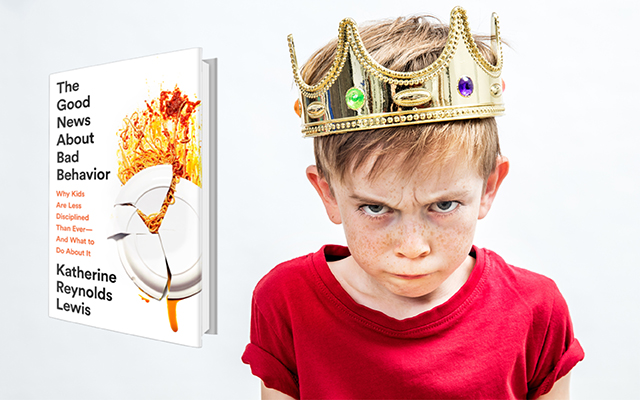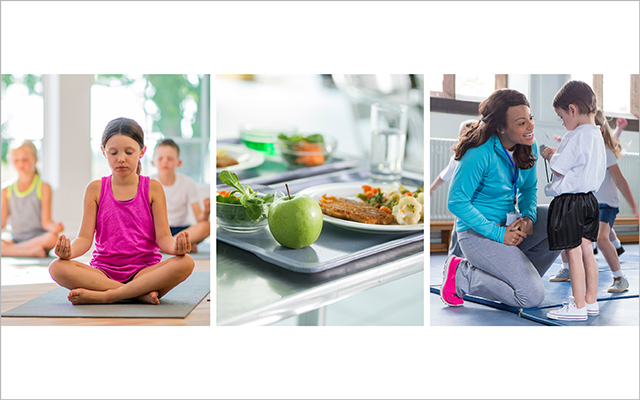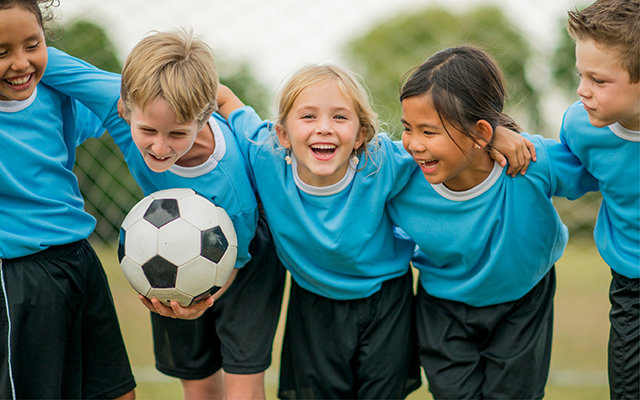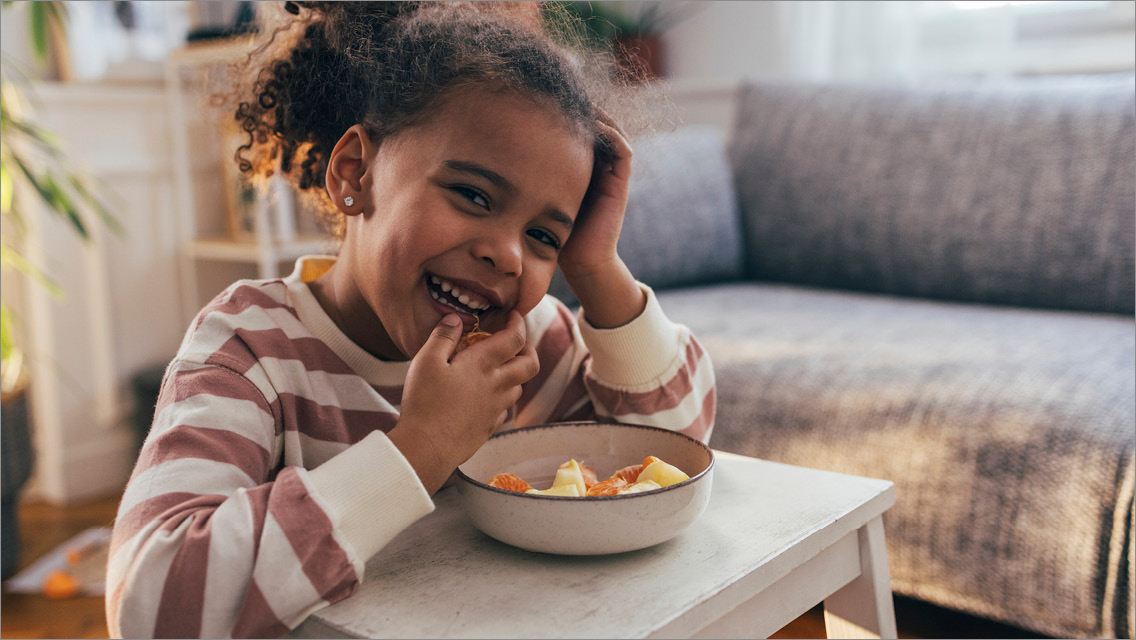“Kids today!”
Seemingly every generation of adults has bemoaned the behavior of children and teens. This particular group of youngsters — so goes the trope — is wilder and more ill-mannered than they ever were.
But journalist (and parent) Katherine Reynolds Lewis contends that kids today actually do struggle more with behavior and do present greater discipline challenges than previous generations. Citing a well-documented rise in mental-health diagnoses over the past 30 years, including depression, anxiety, and attention deficit hyperactivity disorder (ADHD), as well as an alarming increase in suicide rates, Lewis points to a perfect storm of cultural forces that undermine our kids’ ability to control their emotions, thoughts, and impulses. Our children face a “crisis of self-regulation,” she argues, and, left unchecked, this crisis has significant ramifications.
In her new book, The Good News About Bad Behavior: Why Kids Are Less Disciplined Than Ever — And What to Do About It, Lewis argues that parents, teachers, and others tasked with helping to raise children must rethink their approaches to discipline. We spoke with Lewis to better understand the challenges kids face today, to learn why many approaches to parenting are ineffective (and sometimes harmful), and to identify the personal qualities we can help kids cultivate in order to thrive and grow into emotionally healthy adults.
Experience Life | Please give us a sense of the kinds of problems you’re talking about in your book. What do some of these discipline challenges look like?
Katherine Reynolds Lewis | Think of the children with anxiety who have trouble with transitions, who don’t want to leave the house to go to an activity that they were excited about in theory. Those are kids who have trouble managing their emotions — in this case, feelings of fear. The kids who are jumping out of their seats in class are having trouble controlling their impulses. Or think of the children who struggle to manage their attention and thoughts. These are situations where kids haven’t learned how to self-regulate.
EL | Why do today’s children struggle so much with behavior? What’s different now than in earlier generations?
KRL | No. 1 is play. Kids no longer play as much as they used to, or in a lightly supervised way. They’re not getting fresh air, they’re not getting exercise, and they’re also not getting social interaction with other kids, which is how children have always learned social skills, including cooperation. It’s also how kids learn impulse control and even abstract thought — when they’re pretending. The most powerful motivation for children to actually control themselves is when they’re playing with other children without adult intervention.
No. 2 is the growth in technology and social media, which are bombarding us with information that often makes us feel bad about ourselves, plus a celebrity culture that causes us to turn our gaze outward. When we’re looking externally for validation and for signs of what we should want and what we should do, we are not looking inside ourselves for what drives and feeds us. That external focus is associated in clinical research with anxiety and depression.
And the third factor is the decline in connection and community. In our overscheduled lives we often don’t have the time to stop and say hello to a neighbor. Whereas in previous generations, our 12-year-old may have been out mowing a neighbor’s lawn, now he’s going from soccer practice to band to tutoring. Kids often don’t have that sense of how they fit in with their community and how they’re contributing.
EL | To what degree might our parenting and discipline methods also be part of the problem?
KRL | The one ineffective thing that almost every parent does is rely on the reward-or-punishment model as a way to try to make kids behave. But we don’t want our children to grow up always needing someone there telling them what to do, right? We want them to cultivate self-discipline, problem-solving skills, and knowledge of what’s needed in a situation — and the sooner we start doing that, the faster they’re going to develop it.
So when we see our children misbehaving, instead of trying to impose our will on them, we should ask, “What do they need to learn that this situation requires?” And then find the path to that.
EL | You describe three common parenting styles that represent a range of effectiveness when it comes to helping kids find that path to self-discipline. What are these?
KRL | Authoritarian parents try to make the kids do what they want, and their philosophy is, “I am the boss and you must do what I say.” Those are the parents who may get the appearance of compliance because they’re ruling by fear. But the children may turn sneaky and just do what they want. They may get resentful. And often, they end up having a lot of depression and mental-health problems because their own voice is subjugated. They’re also missing that connection and relationship with their parents.
On the other side of the spectrum are permissive parents, who basically put the relationship first. They may think, “I want to be my kid’s friend” or “I don’t want to have conflict,” and then they get walked all over. Children who have permissive parents often don’t really do that great in school, and they may experiment more with drugs and alcohol, because they don’t have a lot of rules. They usually have very good relationships with their parents but will get into more risk-taking behaviors and don’t generally have great outcomes in adulthood for employment, stable relationships, and drug use.
Authoritative parenting is when you have a strong, nurturing connection with your child and a lot of warmth in your interactions, but you set firm and clear limits and you have structure. So you may have an agreement in the family that we all do our chores before we have screen time. Or that we don’t speak to each other with disrespect. When you’re setting a limit or enforcing a family rule, you’re not being mean or angry or yelling. You’re just saying, “The TV is off during dinnertime,” and turning off the TV or standing there until the child turns off the TV. You’re neither caving in the way a permissive parent would, nor yelling or coming down with the hammer the way an authoritarian parent would.
EL | So the goal of discipline seems to be less about getting what we want in the moment and more about helping to develop an adult with certain skills.
KRL | That’s a great way to put it. The original meaning of the word “discipline” in Latin was “to instruct,” or “to teach,” so instead of being about punishing or making kids feel bad, the goal should be to help children learn to self-discipline, to self-regulate, or whatever other missing skill they need in a given situation.
EL | How do we give them those skills?
KRL | Several research-backed models of discipline point to three common components of successful parenting: connection, communication, and capability-building.
Intentional connection between parent and child — where we’re not half listening, on our phones, or distracted by something else — is simply about giving them our attention. It could even be for 15 minutes at a time when we’re engaged one-on-one in an activity together. Another wonderful way to connect is by doing something fun as a family, even just taking a walk together, having family routines, or that bedtime story. All of these activities are putting money in the bank of our relationships that we can draw on when there’s a conflict or a problem — because we’ve built up that strong relationship and connection.
Communication is not just about adults talking to kids, but listening as well, and really trying to see from their perspective. Yeah, I may feel that it’s important to get out the door and to my job on time, but they really love this new flower that’s bloomed up through the garden and it won’t hurt to take 30 seconds and stop and talk about that exciting moment of spring. Or hearing about their problems at school and not jumping in with advice or opinions, but just listening and asking probing questions. This helps them problem-solve and sparks their critical thinking about what the situation might be.
And capability is about learning not only self-regulation skills — managing strong emotions, controlling impulses, learning to plan and organize — but also household skills that really feed kids’ self-esteem. So taking care of a younger sibling, helping to get dinner on the table, planning a family vacation: all of those kinds of things give a child a sense of belonging in the family. They have an important role and they’re contributing to the well-being of other family members. Not only does this build social connection in the family, but it also helps them feel better about themselves and feel that they really matter.
EL | Teaching kids to regulate their emotions, thoughts, and impulses seems like a daunting task. You describe an “apprenticeship model” for this. What does that look like?
KRL | We know that children’s brains are dramatically influenced by their parents, and so when we’re securely connected with our kids, we form a kind of external self-regulation for them. We can help them to practice calming down and regulating themselves. The apprenticeship model teaches children to stay in that regulated state or return to it as quickly as possible.
It goes all the way down to the level of our physiology. Even just being physically next to each other, the parent will influence the child’s heart rate, breathing, and stress level. So when we’re amped up and we’re in a fight-or-flight state, when we’re activated, we’re going to activate our child. If we can be mindful, take a deep breath, calm ourselves before we respond, then we’re teaching our children, even without saying a word. Just that unconscious connection teaches that child how to self-regulate.
EL | So we have to be able to regulate ourselves, too.
KRL | We have to put our own oxygen masks on first, or we cannot help our children. Every time we lose our cool and yell at someone, we’re teaching our children that that’s how we handle stress. Every time we take a minute and a breath and say, “I’m feeling like I’m going to yell, so instead I need to walk outside for five minutes to cool down,” we teach our children to handle conflict in a healthy way.
EL | And the stakes are high.
KRL | This is our children’s mental and behavioral health and future well-being at stake. Even though it seems like it’s a lot of work to control your own response and try to be a very warm-yet-firm parent, the result is you’re going to have a mentally healthy adult who wants to come home at Thanksgiving and spend time with you. Having a mentally healthy adult child who also has a good relationship with you — I can’t think of anything that’s higher stakes than that.
EL | How has writing this book changed your parenting and your relationship with your kids?
KRL | It has completely changed my parenting. Reporting and writing this book really kept me honest. I would be learning about all these important developments in brain science and child development, about how you really should be warm and compassionate with your children, and then the kids would come in and dump their backpacks on the floor and fight! I would have to call on every fiber of strength to be mindful and respond instead of react. It’s also helped me just to take things a little easier. I don’t need my kids to get straight A’s. I need them to learn how to learn, and to have a more long-term view of what success looks like. So that’s really changed us all. I was such a type A, really driven perfectionist, and I think I’ve become more relaxed and more tolerant, and hopefully a better mom.
Learn more about Katherine Reynolds Lewis’s book at katherinerlewis.com, and take her parenting-style quiz at https://apps.facebook.com/…/what-kind-of-parent-are-you-220…




This Post Has 0 Comments